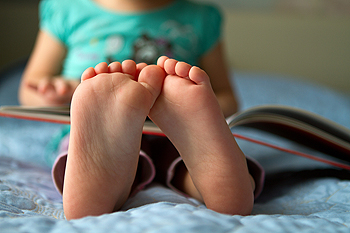October 2020
Reasons for Developing Plantar Fasciitis
 The pain and discomfort that is found in plantar fasciitis is located in the heel and arch area of the foot. It develops as a result of inflammation that affects the plantar fascia. The plantar fascia is a band of tissue that connects the heel to the toes and runs along the bottom of the foot. The contributing factors for developing plantar fasciitis can include standing on hard surfaces for the majority of the day and wearing uncomfortable shoes, such as high heels. Additionally, patients who have gained weight may develop this ailment, and it can affect people who have low or high arches. The pain that accompanies plantar fasciitis can be debilitating, and it is strongly suggested that you are under the care of a podiatrist if you are experiencing heel pain.
The pain and discomfort that is found in plantar fasciitis is located in the heel and arch area of the foot. It develops as a result of inflammation that affects the plantar fascia. The plantar fascia is a band of tissue that connects the heel to the toes and runs along the bottom of the foot. The contributing factors for developing plantar fasciitis can include standing on hard surfaces for the majority of the day and wearing uncomfortable shoes, such as high heels. Additionally, patients who have gained weight may develop this ailment, and it can affect people who have low or high arches. The pain that accompanies plantar fasciitis can be debilitating, and it is strongly suggested that you are under the care of a podiatrist if you are experiencing heel pain.
Plantar fasciitis can be very painful and inconvenient. If you are experiencing heel pain or symptoms of plantar fasciitis, contact Naim G. Shaheed, DPM from Ankle and Foot Centers of Georgia. Our doctor can provide the care you need to keep you pain-free and on your feet.
What Is Plantar Fasciitis?
Plantar fasciitis is the inflammation of the thick band of tissue that runs along the bottom of your foot, known as the plantar fascia, and causes mild to severe heel pain.
What Causes Plantar Fasciitis?
- Excessive running
- Non-supportive shoes
- Overpronation
- Repeated stretching and tearing of the plantar fascia
How Can It Be Treated?
- Conservative measures – anti-inflammatories, ice packs, stretching exercises, physical therapy, orthotic devices
- Shockwave therapy – sound waves are sent to the affected area to facilitate healing and are usually used for chronic cases of plantar fasciitis
- Surgery – usually only used as a last resort when all else fails. The plantar fascia can be surgically detached from the heel
While very treatable, plantar fasciitis is definitely not something that should be ignored. Especially in severe cases, speaking to your doctor right away is highly recommended to avoid complications and severe heel pain. Your podiatrist can work with you to provide the appropriate treatment options tailored to your condition.
If you have any questions please feel free to contact one of our offices located in Lithonia/Stonecrest and Emory/Midtown, GA . We offer the newest diagnostic and treatment technologies for all your foot and ankle needs.
What is Metatarsalgia?
 Metatarsalgia refers to pain that is in the ball of the foot. This term refers to the metatarsal bones that are in this area, and the pain is often a result of repetitive bursts that occur in this part of the foot and eventually overload the metatarsals. Pain over the top and sole of the foot between the 2nd and 4th toes is the most common sign of metatarsalgia. Often, this pain is worsened by pushing off while walking or running. If you are experiencing pain in the forefoot that may be metatarsalgia, it is important to consult with a podiatrist. A podiatrist will check to make sure there is no other damage in the area and prescribe a treatment method. Treatment usually starts with rest and icing the foot, and may include medicine or orthotics.
Metatarsalgia refers to pain that is in the ball of the foot. This term refers to the metatarsal bones that are in this area, and the pain is often a result of repetitive bursts that occur in this part of the foot and eventually overload the metatarsals. Pain over the top and sole of the foot between the 2nd and 4th toes is the most common sign of metatarsalgia. Often, this pain is worsened by pushing off while walking or running. If you are experiencing pain in the forefoot that may be metatarsalgia, it is important to consult with a podiatrist. A podiatrist will check to make sure there is no other damage in the area and prescribe a treatment method. Treatment usually starts with rest and icing the foot, and may include medicine or orthotics.
Foot Pain
Foot pain can be extremely painful and debilitating. If you have a foot pain, consult with Naim G. Shaheed, DPM from Ankle and Foot Centers of Georgia. Our doctor will assess your condition and provide you with quality foot and ankle treatment.
Causes
Foot pain is a very broad condition that could be caused by one or more ailments. The most common include:
- Bunions
- Hammertoes
- Plantar Fasciitis
- Bone Spurs
- Corns
- Tarsal Tunnel Syndrome
- Ingrown Toenails
- Arthritis (such as Gout, Rheumatoid, and Osteoarthritis)
- Flat Feet
- Injury (from stress fractures, broken toe, foot, ankle, Achilles tendon ruptures, and sprains)
- And more
Diagnosis
To figure out the cause of foot pain, podiatrists utilize several different methods. This can range from simple visual inspections and sensation tests to X-rays and MRI scans. Prior medical history, family medical history, and any recent physical traumatic events will all be taken into consideration for a proper diagnosis.
Treatment
Treatment depends upon the cause of the foot pain. Whether it is resting, staying off the foot, or having surgery; podiatrists have a number of treatment options available for foot pain.
If you have any questions, please feel free to contact one of our offices located in Lithonia/Stonecrest and Emory/Midtown, GA . We offer the newest diagnostic and treatment technologies for all your foot care needs.
Plantar Warts Can Be Treated!
Teaching Children Proper Foot Care at an Early Age
 It is important for children to learn at an early age the necessity of properly taking care of their feet. A daily routine may consist of washing them thoroughly, especially between the toes, followed by completely drying the feet. Shoes may last longer when they are aired out after wearing them, and it can help to wash sneakers often, which can keep them soft. The medical condition that is known as athlete’s foot is generally accompanied by symptoms that can include itchy skin and small blisters. This condition can cause pain and discomfort, and may be common among children. It is considered to be contagious, and parents can teach their children to wear appropriate shoes while in public pools and surrounding areas, where fungus is more commonly spread. If you would like additional information about the importance of maintaining your child’s foot health, it is suggested that you consult with a podiatrist.
It is important for children to learn at an early age the necessity of properly taking care of their feet. A daily routine may consist of washing them thoroughly, especially between the toes, followed by completely drying the feet. Shoes may last longer when they are aired out after wearing them, and it can help to wash sneakers often, which can keep them soft. The medical condition that is known as athlete’s foot is generally accompanied by symptoms that can include itchy skin and small blisters. This condition can cause pain and discomfort, and may be common among children. It is considered to be contagious, and parents can teach their children to wear appropriate shoes while in public pools and surrounding areas, where fungus is more commonly spread. If you would like additional information about the importance of maintaining your child’s foot health, it is suggested that you consult with a podiatrist.
Making sure that your children maintain good foot health is very important as they grow. If you have any questions, contact Naim G. Shaheed, DPM of Ankle and Foot Centers of Georgia. Our doctor can provide the care you need to keep you pain-free and on your feet.
Keeping Children's Feet Healthy
Having healthy feet during childhood can help prevent medical problems later in life, namely in the back and legs. As children grow, their feet require different types of care. Here are some things to consider...
Although babies do not walk yet, it is still very important to take care of their feet.
Avoid putting tight shoes or socks on his or her feet.
Allow the baby to stretch and kick his or her feet to feel comfortable.
As a toddler, kids are now on the move and begin to develop differently. At this age, toddlers are getting a feel for walking, so don’t be alarmed if your toddler is unsteady or ‘walks funny’.
As your child gets older, it is important to teach them how to take care of their feet.
Show them proper hygiene to prevent infections such as fungus.
Be watchful for any pain or injury.
Have all injuries checked by a doctor as soon as possible.
Comfortable, protective shoes should always be worn, especially at play.
If you have any questions please feel free to contact one of our offices located in Lithonia/Stonecrest and Emory/Midtown, GA . We offer the newest diagnostic and treatment technologies for all your foot and ankle needs.
What Causes Turf Toe?
 Turf toe, which is another name for a sprain of the metatarsophalangeal joint, the largest joint in the big toe, occurs from a repetitive upward bending of the joint. This often occurs due to sporting activities, such as jamming the toe, or pushing off while jumping or running. Soft soled shoes, combined with hard surfaces, increase the risk for developing turf toe. While turf toe is a common football injury, players of other sports, such as basketball, soccer, field hockey, and lacrosse, are at a higher risk for turf toe as well. Artificial surfaces, especially turf, also lead to an increased risk of turf toe. If you are at a heightened risk of getting turf toe, or you believe that you are suffering from turf toe, it is suggested that you consult with a podiatrist for a proper diagnosis and treatment plan.
Turf toe, which is another name for a sprain of the metatarsophalangeal joint, the largest joint in the big toe, occurs from a repetitive upward bending of the joint. This often occurs due to sporting activities, such as jamming the toe, or pushing off while jumping or running. Soft soled shoes, combined with hard surfaces, increase the risk for developing turf toe. While turf toe is a common football injury, players of other sports, such as basketball, soccer, field hockey, and lacrosse, are at a higher risk for turf toe as well. Artificial surfaces, especially turf, also lead to an increased risk of turf toe. If you are at a heightened risk of getting turf toe, or you believe that you are suffering from turf toe, it is suggested that you consult with a podiatrist for a proper diagnosis and treatment plan.
Ankle and foot injuries are common among athletes and in many sports. They can be caused by several problems and may be potentially serious. If you are feeling pain or think you were injured in a sporting event or when exercising, consult with Naim G. Shaheed, DPM from Ankle and Foot Centers of Georgia. Our doctor will assess your condition and provide you with quality foot and ankle treatment.
Common Injuries
The most common injuries that occur in sporting activities include:
- Achilles Tendonitis
- Achilles Tendon Rupture
- Ankle Sprains
- Broken Foot
- Plantar Fasciitis
- Stress Fractures
- Turf Toe
Symptoms
Symptoms vary depending upon the injury and in some cases, there may be no symptoms at all. However, in most cases, some form of symptom is experienced. Pain, aching, burning, bruising, tenderness, tightness or stiffness, sensation loss, difficulty moving, and swelling are the most common symptoms.
Treatment
Just as symptoms vary depending upon the injury, so do treatment options. A common treatment method is known as the RICE method. This method involves rest, applying ice, compression and elevating the afflicted foot or ankle. If the injury appears to be more serious, surgery might be required, such as arthroscopic or reconstructive surgery. Lastly, rehabilitation or therapy might be needed to gain full functionality in the afflicted area. Any discomfort experienced by an athlete must be evaluated by a licensed, reputable medical professional.
If you have any questions, please feel free to contact one of our offices located in Lithonia/Stonecrest and Emory/Midtown, GA . We offer the newest diagnostic and treatment technologies for all your foot care needs.









